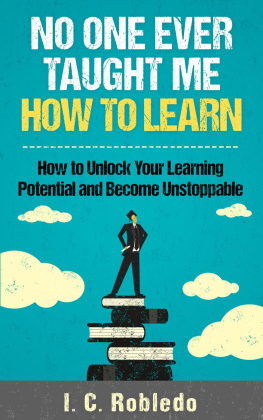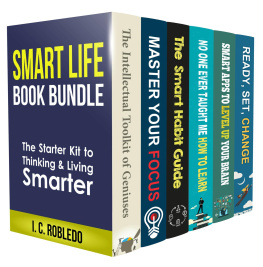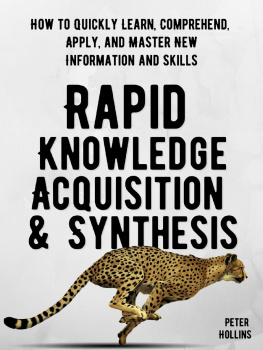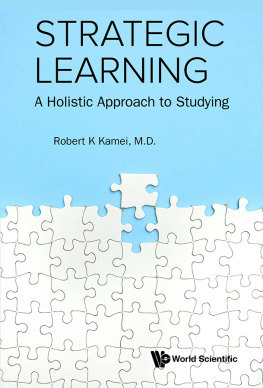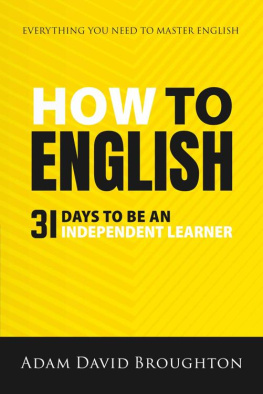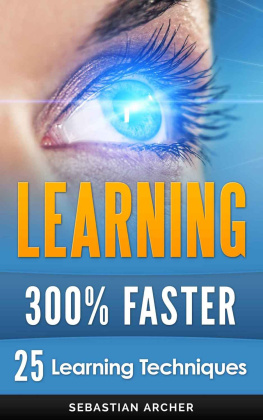No One Ever Taught Me How to Learn: How to Unlock Your Learning Potential and Become Unstoppable
Master Your Mind, Revolutionize Your Life, Volume 4
I. C. Robledo
Published by I. C. Robledo, 2015.
No One Ever Taught Me How to Learn: How to Unlock Your Learning Potential and Become Unstoppable
Copyright 2015 by Issac Robledo.
All Rights Reserved. No part of this book may be reproduced in any form without written permission from the author. Brief passages may be quoted for review purposes.
Disclaimer
Although the author and publisher have made every effort to ensure that the information in this book was correct at press time, the author and publisher do not assume and hereby disclaim any liability to any party for any loss, damage, or disruption caused by errors or omissions, whether such errors or omissions result from negligence, accident, or any other cause.
This book is not intended as a substitute for the medical advice of physicians. The reader should regularly consult a physician in matters relating to his/her health and particularly with respect to any symptoms that may require diagnosis or medical attention.
The views expressed are those of the author alone and should not be taken as expert instruction or commands. The reader is responsible for his or her own actions.
Adherence to all applicable laws and regulations, including international, federal, state, and local governing professional licensing, business practices, advertising, and all other aspects of doing business in the US, Canada, or any other jurisdiction is the sole responsibility of the purchaser or reader.
Neither the author nor the publisher assumes any responsibility or liability whatsoever on the behalf of the purchaser or reader of these materials.
Any perceived slight of any individual or organization is purely unintentional.
Table of Contents
Why does Learning Matter?
I think we all have a pretty good idea about why learning matters, but I believe its important to review why it is especially relevant today. We live in a time when there are many world issues that are constantly evolving, and that demand for educated and learned individuals to evaluate complex scenarios. Some of these issues are: poverty, hunger, climate change, limited energy, pollution, the threat of nuclear warfare, and a lack of education. To tackle such problems, among many others, will require people who take learning seriously, and dont jump to conclusions in their search for answers. Of course, no one book or learning approach can tackle all such problems. But I think we can agree that people who work to improve their learning ability will be more likely to put a dent in finding solutions.
As another matter, learning will be an important part of the modern workers life. According to the Bureau of Labor Statistics (BLS), baby boomers held an average of eleven jobs from the ages 18 to 46. It seems likely that most workers going into the future will hold at least that many in their lifetimes. With each new job, new skills may need to be learned. Also, many people who attend college will find a job or career that is outside of their major area of study. According to a CareerBuilder survey of 2,134 workers, 47% of college educated workers took a first job that was unrelated to their major, and 32% of college educated workers never found a job related to their major. According to such findings, it is likely new workers will have plenty to learn upon entry into their first job as it may be unrelated to the field they studied in college. Jobs are also demanding more and more from the employees that they do have, due to economic concerns and the drive to increase profits. People with solid learning skills will likely find themselves much better able to learn the new skills needed, and to compete when looking for employment.
The prior points dont even consider that knowledge itself is growing and changing. Facts that were once well accepted no longer are. The usual example is that we once believed the world was flat. Of course, we dont need to go back that far to find an example. Nutritional advice has shifted greatly over the past hundred years. As Michael Pollan reviews, in In Defense of Food, in the 1950s margarine was seen as a healthy alternative to butter since it didnt have saturated fat, then years later it was found that the trans-fats in margarine were even worse than the saturated fats they replaced. Of course by this point people no longer thought margarine was so healthy. The knowledge and information available to the public had completely changed. As another example, it wasnt so long ago (from 2006 and earlier) that Pluto was taught in schools as being a planet. It was viewed as a planet for 76 years. Now, it is believed to be one of many large icy bodies in the outer solar system, and is no longer defined as a planet by scientists.
With the internet and better technological equipment, knowledge is growing and growing. What was seen as true even ten years ago or less may now be viewed as a misconception or as false. With the vast spread of information also comes a spread of misinformation. Not everything we learn today will be seen as correct in the future, and so its important that we take some time to think about what we are learning, and how we learn it.
In essence, there are many reasons why learning is more important now than ever before. For example, we face an ever growing list of world problems to deal with, people are changing jobs more which demand learning new skills, and the information available to us is expanding faster and faster. We must prepare ourselves for a rapidly changing and evolving world. Part of this preparation will be in training ourselves to learn with sound techniques, rather than learning based on myths or with little direction.
Introducing Learning as a Powerful Skill
Y ou may be thinking that every field or skill requires a different way to learn it. To learn piano may be different from mathematics, which may be different from painting. This can be true. For that reason it is always helpful to have an instructor or a tutor, but there are also some solid principles of learning that should generally hold true regardless of the specific content that you want to learn. Those learning principles can be learned and applied to different fields and skills.
The thing to understand is that learning is a skill like any other. Of course, it can take some instruction and practice to become a good learner. Most importantly, you should realize that even if youve been labeled a slow learner, or a bad learner, there are ways to improve your learning. This is because learning itself is a skill that can be improved upon. Its not a static part of you that can never be changed.
Its a shame that as a society we often focus strictly on the content that is to be learned, rather than the process of learning itself. We often are expected to learn something new, and to learn it fast and accurately. But what if youve developed bad learning habits? And what if you are overconfident that your particular learning techniques are effective, but theyre in fact counterproductive. You may be surprised to find that such mistakes are quite common. The particular techniques which are more effective or less so will be discussed later in this book to help you on the path to learning effectively and ridding yourself of bad habits.

